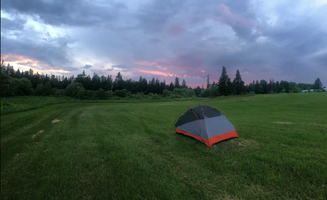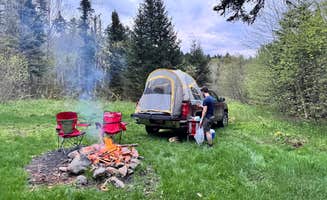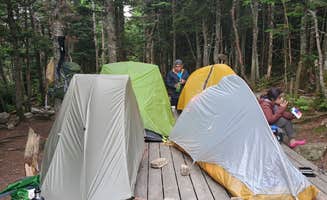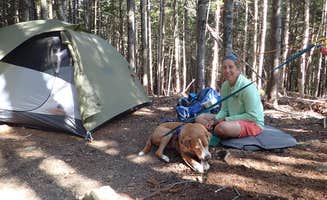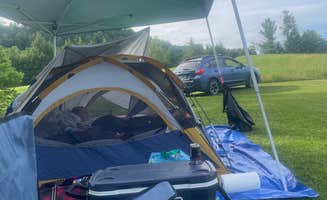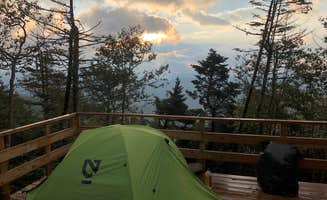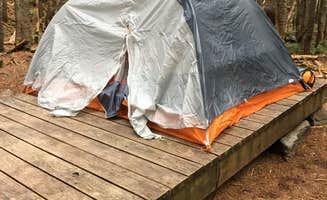Dispersed camping options near Island Pond, Vermont offer primitive tent sites on the Connecticut River Water Trail system. Campers access these sites via paddling routes, with many locations providing waterfront tent camping in remote settings. Most sites require water filtration or treatment since potable water isn't available. During summer months, visitors can paddle between campsites for multi-day adventures, though early season may present high water challenges and late season brings colder conditions.
What to do
Paddle and camp along the Connecticut River: The Maine Railroad Trestle site connects to the Connecticut River Paddlers Trail network. "While reservations are not required, there is a registration page on the CT River Paddler's Trail Website that they ask folx to complete just so spots don't get overcrowded," notes camper Sarah C. The area features a rocky beach for easy loading and unloading plus good fishing opportunities.
Fly fish mountain ponds: The area contains several remote ponds stocked with brook trout. At Unknown Pond, "The pond is beautiful and open to fly fishing for those with a NH fishing license. While I didn't have much luck with the fish, I was certainly surrounded by a multitude of frogs!" according to Sarah C. Bring a valid fishing license for either Vermont or New Hampshire depending on which side of the border you camp.
Explore hiking trails: Several camping areas connect to regional trail networks. The Devil's Rest Shelter sits along the Cohos Trail. Camper Justin P. notes it's "a beautiful structure nestled in the woods, with a privy nearby and a bear box." This makes a good stopping point for backpackers covering sections of the 170-mile trail system.
What campers like
Wildlife viewing opportunities: Many tent sites provide excellent chances to observe local wildlife. At Remote Sites — Umbagog Lake State Park, you can "kayak with Bald Eagles soaring over your head," according to Rebecca A., while another camper mentions "plenty of wildlife including loons, ospreys, eagles and other birds. Moose and Bear maybe spotted."
Privacy and solitude: Campers consistently mention the quiet nature of remote sites. At Serenity Field, Matt H. describes "Semi private tent only camping in a beautiful field! Can pull your car right up to the site. Super quiet and secluded." The more remote water-access sites provide even greater isolation for tent campers seeking to escape crowds.
Swimming opportunities: Many campsites offer water access. Nancy B. describes her experience at Umbagog Lake: "We were the only ones on the island. We kayaked in the day. Was amazing!" Similarly, Jim H. notes "the water is excellent for swimming" at the remote sites, making these locations ideal for cooling off during summer months.
What you should know
Water filtration needs: Almost all primitive sites require water treatment. For tent camping at Green River Reservoir State Park Campground, "The reservoir is 653 acres with 19 miles of shoreline... Be sure to paddle out to the Beaver Meadow - we have seen moose there several times," says Tara S., who also advises "the reservoir provides drinking water so be sure to carry in a water filtration system, chemical treatment or plan to boil water."
Limited facilities: Prepare for truly primitive camping conditions. Most sites have only basic fire rings and sometimes tent platforms. John L. describes the remote Umbagog sites: "The sites have a pit toilet and fire ring. While there were plenty of eagles, loons, and fish we only saw two other boats the entire weekend."
Weather preparedness: Northern Vermont weather can change rapidly with significant temperature drops at night, even in summer. At Unknown Pond, "there can be snow on north facing slopes into June so be prepared to post hole or carry snowshoes," according to one reviewer. Pack additional layers regardless of season.
Tips for camping with families
Choose accessible sites: For families with young children, select sites with easier access. John L. shares his experience: "The remote campsites at the northern end of Umbagog Lake are wonderful. This trip consisted of my family of five with three kids (ages 5-13)... We put our boats in at the National Wildlife Refuge and paddled in on Bear Brook. The paddle was just around 2.5 miles and calm flat water. Just perfect for our kids."
Plan for bug protection: Insect repellent is essential for family comfort. Rebecca A. warns about Umbagog Lake: "Bring the bug spray mosquitoes are fierce!" Similarly, sites near standing water tend to have more insects, particularly in June and early July.
Consider transport logistics: When camping with kids at Lyman Falls State Park Campground, note the access challenges. One camper explains: "If you chose to drive, you will have to park at a small parking area indicated by a few large boulders and then carry your things in about 200-250 yards." This distance might be challenging with small children and gear.
Tips from RVers
RV access limitations: Most of the best tent camping near Island Pond, Vermont isn't suitable for RVs. The remote and primitive nature of these sites generally restricts access to tent campers only. Larger vehicles can't reach the majority of these sites, particularly water-access locations.
Alternative options: RV campers should look for established campgrounds with drive-in access rather than the dispersed and primitive sites popular with tent campers. The nearest RV-friendly options typically require traveling outside the immediate Island Pond area.
Day-use options: Consider parking your RV at designated areas and using smaller watercraft to access the remote camping areas for day trips. Leslie B. mentions: "Stayed at site R18-gorgeous views, clean site with tent platform... you will have to figure out how to get firewood there. Which is tough when you are in a kayak, canoe or other small paddle craft."





